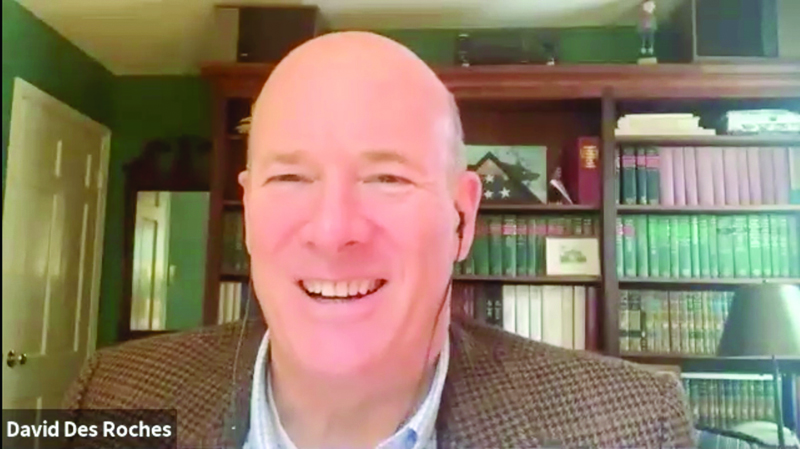
KUWAIT: Reconnaissance Research hosted a virtual forum in collaboration with the 'Harvard Club of Kuwait' on Oct 30 featuring a panel of four regional experts, as well as moderation by Kirsten Fontenrose, the Director of the Scowcroft Middle East Security Initiative at the Atlantic Council and a member of Reconnaissance Research's US Advisory Board. The forum discussion reflected an array of perspectives on various aspects of United States-Gulf Cooperation Council (US-GCC) relations, including energy, security, and economic development, with an eye toward potential policy shifts following the upcoming US presidential election.
Professor David Des Roches and Dr Abbas Kadhim provided insight about the Gulf's evolving political and military importance and how US policy toward it may shift moving forward, while Sheikh Nawaf Al-Sabah and Faisal Al-Hamad spoke more about the consequences of the region's shifting economic circumstances. All panelists urged the necessity of a paradigm shift in US policy in the Middle East as they answered questions from both the moderator and viewers.

Dr Abbas Kadhim 
Sheikh Nawaf Al-Sabah
Shift in security focus
Though both parties have recently indicated an interest in reducing the US' military footprint in the Middle East, Professor Des Roches and Dr Kadhim both argued that a full withdrawal would be unlikely and unwise. Professor Des Roches suggested that the US is far more interested in threats from China and Russia than in the Gulf, and that its regional security policy has mostly reflected this shift as most, but not all, troops have withdrawn.
One major exception he noted is the US' continued reliance on aircraft carriers in the Gulf and permanent military installations near Iran, which he argues are dangerous relics of past administrations' policies. This inflexible posturing, he said, should be replaced with expeditionary forces and more robust logistics networks such as rail from the Red Sea to the Gulf.
Dr Kadhim spoke more directly to potential shifts in US-Iraqi relations and how they may impact the region at large. If President Trump wins, he says, US policies are not likely to change: Iraq will remain a "subheading" of policy toward Iran. Reelection may reinforce a number of challenges Iraqis face in complying with trade sanctions under the "maximum pressure" campaign. In contrast, a Biden administration is likely to relieve tensions with Iran, which would play well throughout Iraq. That said, Biden has indicated support in the past for a variety of less popular positions, including the 2003 invasion and geographic partition.

Faisal Al-Hamad 
The panel’s moderator Kirsten Fontenrose.
Energy plays key role
Probably the most significant possible impact of the US election mentioned throughout the forum was a shift in energy policy. While Sheikh Al-Sabah believes policy between American administrations has remained fairly consistent aside from shifts in tone, he noted that Biden's plan to reduce drilling in federal lands and increase carbon dioxide sequestration regulations would decrease American market share and increase its cost of electricity production by up to three times.
He made reference throughout the forum to the increased popularity of electric vehicles, suggesting that if the Biden platform were to be realized, the resulting increase in the cost of electricity would sustain the viability of the internal combustion engine. For this reason, he felt comfortable about Kuwait and the GCC's long-term oil production outlook.
Aside from this point, Sheikh Al-Sabah was in agreement with Al-Hamad that the impact of the election on GCC economies would be marginal. Al-Hamad focused more on the challenges presented by the coronavirus pandemic, which he said has exposed preexisting issues of youth unemployment and fiscal deficits. He urged careful and directed government investment in private sector job creation, alongside educational reform. Al-Hamad pointed to logistics, technology, and green energy alternatives as sectors Kuwait and the rest of the GCC are well-positioned to exploit.
Balance opinion with action
Each of the panelists considered questions submitted by viewers, ranging from topics like Russia's presence in the Middle East to the impact of potential drilling in the Eastern Mediterranean. A major recurring theme was the increasingly central role of popular opinion and consent in the Middle East. Dr Kadhim in particular noted that regardless of the varied forms of government found throughout the Arab world, each is exhibiting an opening toward popular representation at their own pace.
With the exception of older generations of Kuwaitis who still celebrate the US coming to its defense in 1991, Arabs (and especially Arab youth) are increasingly critical of whether they can benefit from a relationship with either a Trump or Biden administration.
When asked how they would pitch the importance of sustained and reshaped GCC relations to whomever wins the election, the panelists honed in on ways their own fields of interest would play a role. Professor Des Roches emphasized that even though Russia is not currently capable of providing sustainable security for the region, a full American withdrawal may provide it or other potentially malicious actors the opportunity to step in.
Al-Hamad reiterated the importance of achieving clarity among Arab youth about how a relationship with the US could benefit them, particularly in combating youth unemployment. Dr Kadhim urged a shift away from strictly oil- and security-based relationships to more mutually productive and respectful ones, which might focus more on education or technology.
Finally, Sheikh Al-Sabah pointed out that demand for hydrocarbons will persist in the decades to come even as renewable energy surges. Since GCC countries produce them at lower cash and environmental costs than any other part of the world, he believes they will remain important players in the global energy field for the foreseeable future.




